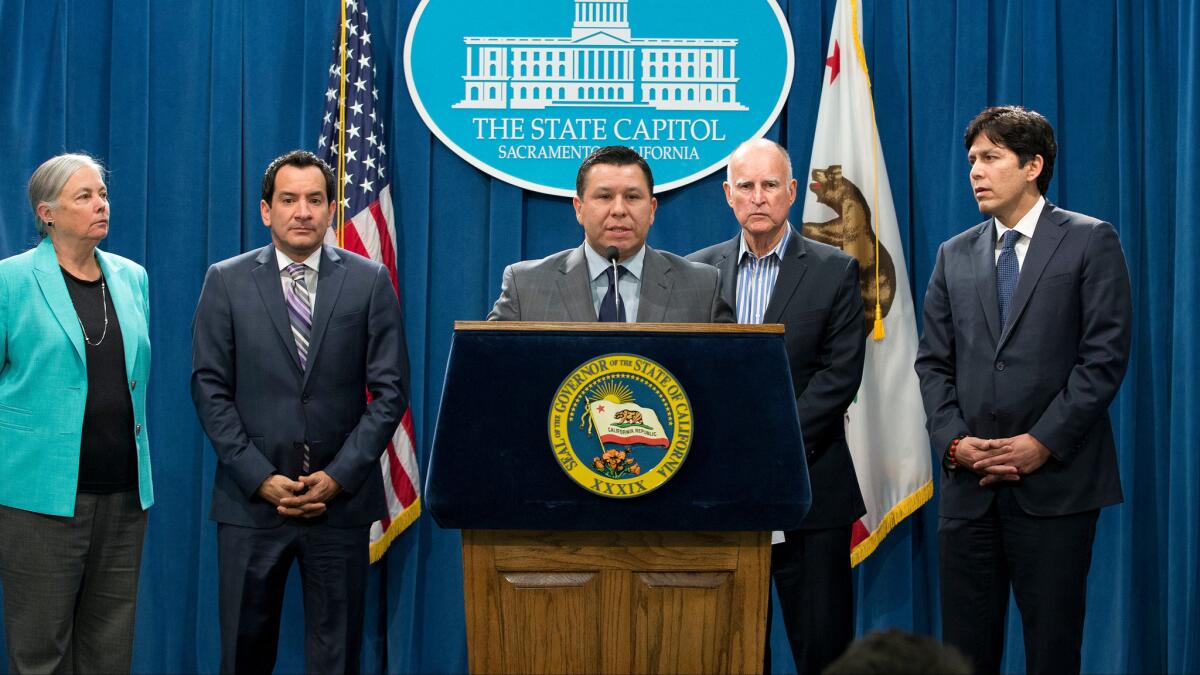The fight against climate change in California gains an unlikely ally: Republicans
Reporting from Sacramento — Stepping further into its role as the nation’s pioneer on climate issues, California might soon clear a hurdle that has long frustrated environmental advocates: Republicans say they’re joining the fight against global warming.
Assembly Republican Leader Chad Mayes (R-Yucca Valley) and some of his colleagues are taking the unusual step of embracing the state’s complex regulations to reduce greenhouse gas emissions, pledging to work with Democrats at the same time President Trump rolls back national environmental policies.
“Californians, whether you’re a Republican or a Democrat, are different from the rest of the country,” said Mayes, who represents parts of Riverside and San Bernardino counties. “What they’re doing back in Washington, D.C., is not what we’re going to be doing in California.”
Mayes and almost all of his colleagues voted against last year’s measure to set a new, tougher target for slashing greenhouse gas emissions by 2030. But now that the goal has become law, he wants to work with Democrats on extending the cap-and-trade program, which requires companies to buy permits to release emissions into the atmosphere.
“It would be foolish not to engage,” said Mayes, who has huddled with a cadre of Assembly Republicans to start developing their own ideas about limiting the price of emission permits and using the program’s revenue for tax credits or rebates. Their stance aligns with that of industry groups such as oil companies and food processors that have already backed cap and trade as a more cost-effective alternative to stricter rules for cutting emissions.
Lawmakers are debating the program’s future because there are legal questions over whether cap and trade can continue operating after 2020, and the Republicans’ effort to get involved could reshape this year’s conversations over policies that are usually crafted by Democrats debating among themselves. The law that launched cap and trade was signed in 2006 by Republican Gov. Arnold Schwarzenegger, an outspoken champion of fighting global warming, but he’s been a high-profile exception to the deep partisan divide on the issue.
Gaining bipartisan support for cap and trade, California’s most high-profile climate initiative, could be a political coup for Gov. Jerry Brown at a time when Trump is threatening an international agreement on global warming. It could also offer new paths toward a two-thirds vote to extend the program, a higher level needed to protect it from legal challenges. Democrats hold enough seats to reach that threshold on their own, but just barely, a challenge that became clear during a nail-biter of a vote to raise taxes to fund road repairs.
However, finding middle ground could be difficult. Republicans, who are a small minority in the Legislature, haven’t written legislation of their own and they’re asking for compromises that Brown and his fellow Democrats may be unwilling to concede.
Perhaps most notably, Mayes opposes a Democratic proposal to modify the cap-and-trade program so it addresses both greenhouse gases and pollutants that cause public health problems such as asthma.
Although both goals are important, he said, “we should be addressing those in different ways.”
But Democrats are increasingly aligned with environmental justice advocates who want to merge climate policies with stricter regulations to address pollution concerns in disadvantaged communities.
“Without clean air being part of the discussion, there are no 54 votes to be had” to reach the two-thirds threshold, said Assemblywoman Cristina Garcia (D-Bell Gardens), a chief architect of this year’s climate legislation. “There are too many Democrats that won’t come to the table.”

More disputes could involve how cap-and-trade revenue is used. Republicans want to spend it on rebates or tax credits to offset higher prices that could be generated by climate regulations, sapping funding Democrats have used for projects intended to reduce greenhouse gas emissions. Some of the money has also been dedicated to building the bullet train from Los Angeles to San Francisco, a priority for the governor and a frequent source of Republican criticism for its delays and high price.
Despite the hurdles to a bipartisan deal, Mayes and some of his colleagues see an opportunity for Republicans to get involved with an issue important to California voters. Four out of five believe climate change is a serious threat to the state, according to a poll conducted last summer by the Public Policy Institute of California.
“You look on what’s going on in the Antarctic, in the North Pole, you look at the issue of sea-level rise. It’s an issue that we need to be concerned about,” said Assemblyman Rocky Chávez (R-Oceanside), who’s working with Mayes. “We want to be part of the solution.”
They’ll face a political balancing act, and goodwill for cap and trade remains divided along partisan lines. The PPIC poll said 62% of Democrats support the program, compared with 33% of Republicans.
Brown publicly doubted Republicans would back cap and trade during a hearing on gas taxes earlier this month.
When Assemblyman Vince Fong (R-Bakersfield) expressed concerns that extending the program would also increase gas prices, Brown shot back, “You’re not going to vote for cap and trade anyway.”
The governor continued, “Look, cap and trade is about climate change, which you don’t believe in and your president says is a hoax.”
Mayes said that doesn’t apply to him, acknowledging the reality of climate change and humanity’s contributions to the problem. He conceded that not everyone in his caucus is on board with his efforts to reach a deal on cap and trade, but believes it’s an opportunity for Republicans to be influential despite their small numbers.
“When you’re at 25 [seats in the 80-seat Assembly], what have you got to lose?” he said.
Twitter: @chrismegerian
ALSO
As the White House changes course on climate change, California stubbornly presses forward
Trump is creating a void on climate change. Can California persuade other states to help fill it?
Updates on California politics











